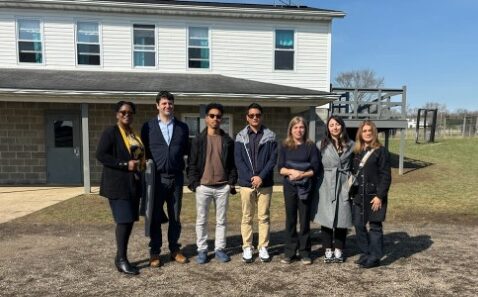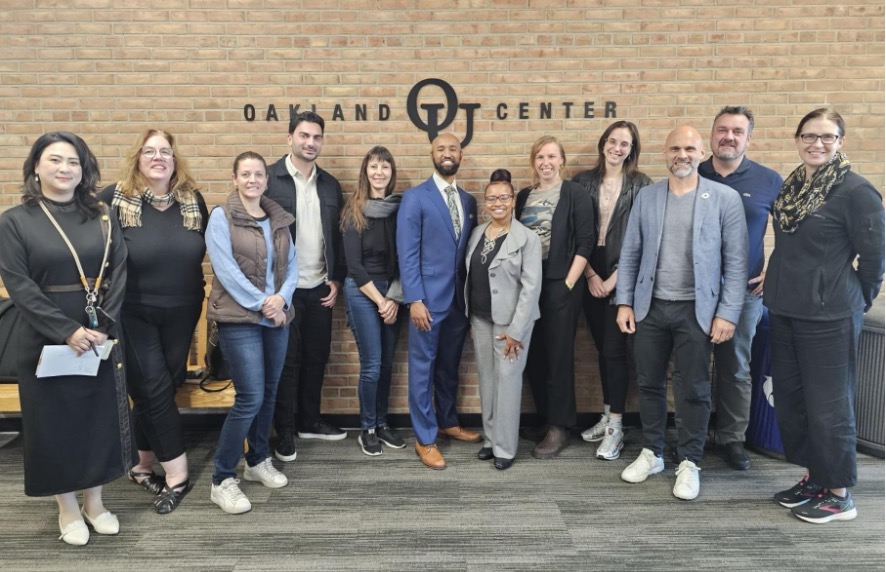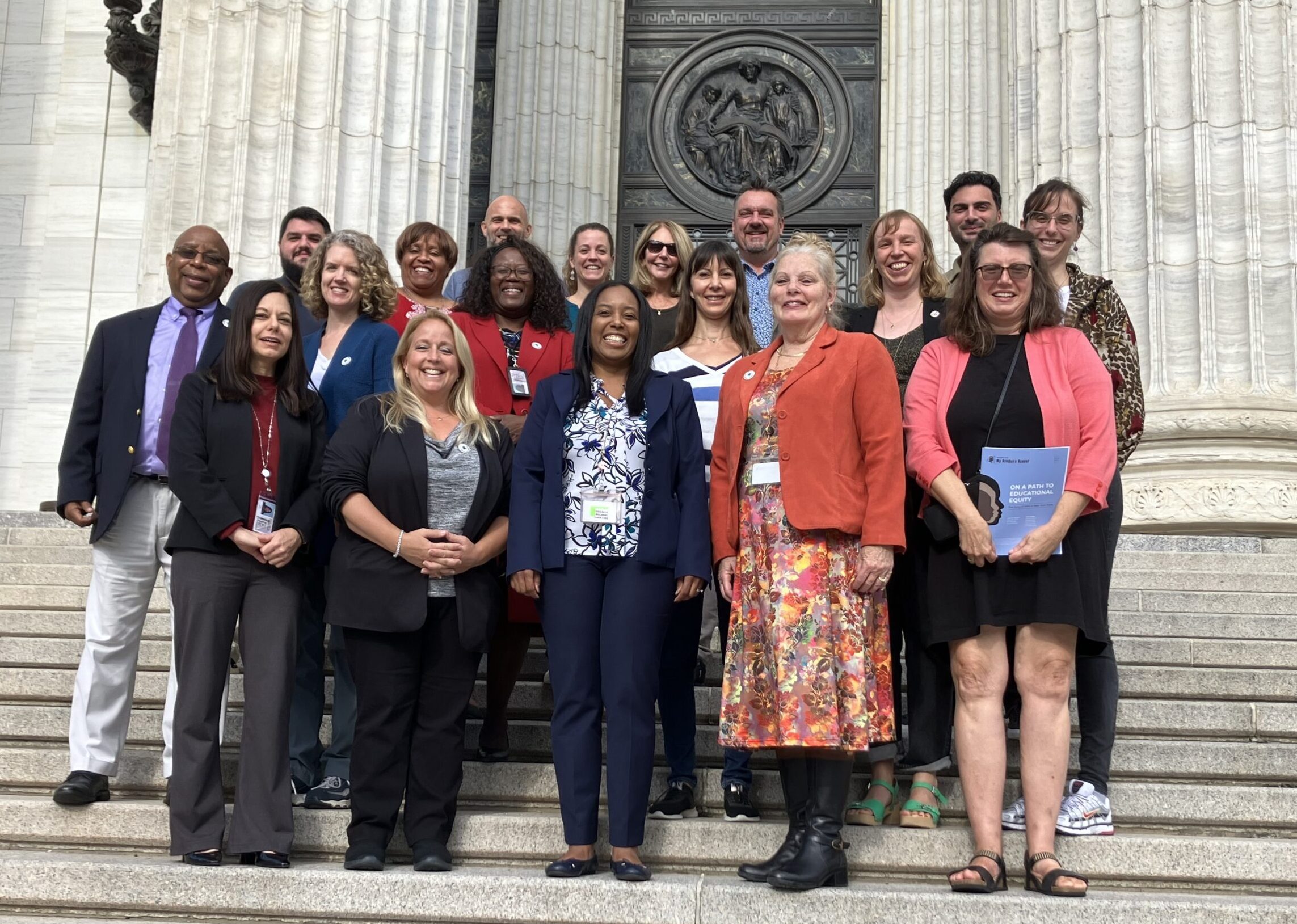Compiled by Angelora Castellano, Fall 2024 Communications Intern
As we celebrate International Education Week this November 18-22, Global Ties U.S. highlights the transformative role of educational exchange in strengthening communities and workforces worldwide. Global Ties Network members reflect on how initiatives like the International Visitor Leadership Program (IVLP) can bring together educators, administrators, and leaders from diverse backgrounds to encourage the sharing of best practices and inspire new approaches to teaching and learning. The Global Ties Network connected with these participants to foster cross-cultural dialogue and professional collaboration and contributed to a broader mission of international education and lifelong learning.
Boulder Council for International Visitors
IVLP: Exploring Higher Education Partnerships
NPA: MCID Washington
By: Garrett McGannon, Assistant Programming Director
In October 2024, the Boulder Council for International Visitors (BCIV) had the unique opportunity to host an International Visitor Leadership Program (IVLP) delegation of university representatives from across the Middle East and North Africa (MENA) region. This group—comprising leaders from Chad, Egypt, Iraq, Libya, Qatar, and Saudi Arabia—came to Colorado to explore the U.S. model of higher education and uncover insights into how universities and community colleges develop partnerships to promote access, innovation, and global collaboration.
The visitors met with representatives from a variety of institutions. The delegation started at Front Range Community College, where they got a firsthand look at a model of higher education that prioritizes accessibility, technical training, and community-based learning. Conversations with Front Range’s faculty highlighted how the institution works closely with local industries, creating an adaptable curriculum that meets both community needs and industry demands—a concept quite different from many of the universities the delegates oversee.
For the delegation, learning how these partnerships are cultivated over time was eye-opening. Community colleges, like Front Range, serve as an educational foundation for a diverse range of students, from recent high school graduates to mid-career professionals, which is not common in many MENA-region universities. This adaptability was inspiring to the visiting delegates, who were curious about how they might implement similar community-driven models within their own institutions to bridge educational gaps.
The group’s visit to the University of Colorado Boulder took this exploration to another level, showcasing how large public universities manage partnerships on a global scale. Meetings with the university’s Mortenson Center for Global Engineering and Resilience revealed just how powerful strategic academic partnerships can be in advancing research and tackling global challenges. The Center’s focus on developing resilient systems and sustainable engineering solutions resonated deeply with the delegates, whose home countries often face unique environmental and infrastructural challenges.

IVLP visitors touring educational institutions. Image provided by author.
Another highlight of the visit was the delegation’s time at Naropa University, where they were introduced to the school’s unique approach to contemplative education. Naropa’s philosophy blends rigorous academics with mindfulness practices, encouraging students to explore their own inner landscapes alongside their studies. For the MENA delegates, this approach was refreshingly different and sparked lively discussions about the role of introspection in education. As Naropa shared resources on contemplative practices, the delegates found themselves envisioning ways to bring a touch of this mindful approach back home, adding an unexpected layer of inspiration to their trip.
Beyond these formal meetings, BCIV organized a series of home hospitality dinners, where delegates joined Boulder families for an evening of cultural exchange. These gatherings were among the most memorable moments, allowing delegates and locals to bond over shared meals and experiences. One delegate remarked that while the formal meetings were insightful, it was in these personal moments where they truly felt the impact of international education as a bridge between people and ideas.
Reflecting on the visit, it’s clear that programs like IVLP are more than just academic exchanges; they’re pathways for understanding how to nurture educational ecosystems that are collaborative, adaptive, and inclusive. The delegates left Boulder with new perspectives, equipped with ideas to drive innovative partnerships in their universities back home.
Cleveland Council on World Affairs
IVLP: Education in the Digital Age
NPA: FHI 360
By Andrew Kovach, Director of Exchanges
Step into most classrooms today and you might be confronted with smart boards, projectors, computers, and tablets. But what does education look like in rural communities that do not use modern technology? In March 2024, an IVLP group on the topic “Education in the Digital Age” visited some of Cleveland’s many universities, colleges, and school districts to learn how tech is integrated into their curriculum. They also had the unique experience of visiting an Amish schoolhouse, where a traditional way of life influences learning.
A short drive from the industrial urban center of Cleveland is Amish Country, where there are a handful of Amish communities living according to traditional Christian beliefs and deliberately avoiding modern technology. The Amish education system provides formal instruction from the first grade through the eighth grade. The curriculum addresses the basics, which include reading, math, writing, and some history and art.
When visiting an Amish schoolhouse, the visitors from Burma, Jamaica, Nepal, among other countries, stepped into a building with two classrooms for approximately 40 pupils. Despite preconceived notions of what a “low-tech” classroom would look like (let alone one where there is no electricity), there were many similarities to non-Amish schools. There were colorful classroom posters, games, and pencil boxes. Students outside played volleyball and hopscotch. The visitors walked between rows of student desks to observe students reading from textbooks and working on math calculations.

IVLP participants from Burma, Jamiaca, Kuwait, Nepal, Turkiye, Romania, and Slovenia visit an Amish schoolhouse. Image provided by author.
Despite some initial shyness, the students greeted the visitors and introduced themselves. One special highlight was the students singing together to help welcome the visitors. In addition to the traditional curriculum, the arts and music play an important role in the Amish religion and community. There was a world map at the front of the classroom that the international visitors used to eagerly pinpoint their various countries to the class.
For the visitors, visiting an Amish school was a transformative experience that challenged conventional ideas on what an education can look like. A teacher shared that while formal education ends at the eighth grade, many students go on to pursue complex tradecrafts, carpentry, agriculture, and entrepreneurial ventures. Skillsets are passed down through generations of Amish families. In conclusion, this IVLP excursion to an Amish classroom fostered a two-way mutual understanding and embodied international education by learning from different cultures coming together.
Global Ties Alabama
IVLP: Promoting Service Learning and Career Counseling in Education
NPA: Cultural Vistas
By: Kezia Daniel, Senior Operations Lead
In April 2024, Global Ties Alabama hosted five international educators from the country of Georgia for an International Visitor Leadership Program focused on service learning and career counseling. The program offered these IVLP leaders with hands-on exposure to district-wide approaches that support skills development and the practical application of academic knowledge in real-world settings beyond the classroom.
The visitors met with local educators, including the Huntsville City Schools Superintendent, and representatives from the Career and Technical Education Division at Grissom and Jemison High Schools. They also visited the Alabama Institute for the Deaf and Blind and the Alabama School of Cyber Technology and Engineering. Additionally, they explored the Morgan County School System’s Technology Park, where the educators engaged directly with advanced technical skills.
This program showcased diverse educational models that integrate real-world applications into student learning. This program has supported Georgian educators in building the capacity to implement robust career services, service-learning programs, and partnerships in their schools.
Global Ties Detroit
IVLP: Promoting Teaching and Learning in Diverse Classrooms
NPA: Cultural Vistas
By Charlotte Little, Program Coordinator
This past October, Global Ties Detroit teamed up with Cultural Vistas and welcomed an International Visitor Leadership Program (IVLP) delegation of seven teachers and school administrators from Switzerland for an exciting program focused on Promoting Teaching and Learning in Diverse Classrooms. During their five days in Detroit, the delegation met with their professional counterparts in various schools, universities, and education associations across Southeast Michigan. Their conversations highlighted how, as instructors, they can create learning environments inclusive and appreciative of their students’ various cultures, languages, and socioeconomic standings.
Metro Detroit is a multicultural melting pot, which the delegates got to observe in visits to Fordson High School and the Academy of the Americas (AoA). Fordson is in Dearborn, Michigan, a city with a population that is over 50 percent Arab American. This is heavily reflected in the school’s Arab-ancestry student majority. AoA is a bilingual K-12 school with a Spanish-English dual immersion curriculum, beneficially located in the Hispanic-centric neighborhood of Southwest Detroit, which primarily serves students of the many Spanish-speaking immigrant families. The visitors left in awe of the schools’ majority-minority student bodies, and their discussions with administrators allowed them to observe the schools’ best practices for integrating the students’ identities into the curriculum in a way that respects and honors them.

IVLP visitors at their meeting with Oakland University faculty. Photo provided by author.
The delegation also got to stop by an American college and met with Oakland University’s English Language Institute (ELI), which supports the school’s English-learning students in their academic studies, demonstrating the role educational institutions play in establishing meaningful connections through learning across linguistic and cultural variations. The meeting was not only a learning opportunity for the Swiss teachers, but Oakland faculty identically enjoyed the connection: “We mutually gain so much from these campus visits,” the ELI’s ESL Coordinator Elizabeth Adams shares. “It was such a pleasure to meet everyone and to spend such quality time together.” Through the exchange of their ideas and experiences, both parties gained new perspectives on how to be more equitable educators – as well as new friendships.
Bridging the Swiss teachers to Detroit’s educators was an honor for Global Ties Detroit and was a valuable way to illustrate how classrooms across the world can be pivotal to uplift young learners, while celebrating who they are.
International Center of the Capital Region
IVLP: Promoting Teaching in Diverse Classrooms
NPA: Cultural Vistas
By Holly McKenna, Executive Director
From October 2-7, the International Center of the Capital Region in Troy, NY, hosted seven Swiss educators as part of the International Visitor Leadership Program (IVLP) “Promoting Teaching in Diverse Classrooms.” The program, in partnership with Cultural Vistas, centered on a variety of key educational themes, which included community support for multilingual and multiethnic students and families and advancing equity and closing opportunity gaps for students of color.
At the historic State Education Building, participants learned valuable insights from the directors of the New York State My Brother’s Keeper program. This organization helps boys and young men of color, including seven tribal nations, to succeed inside and outside the classroom. The visitors also heard about efforts to significantly increase the number of individuals from historically underrepresented and economically disadvantaged groups entering teaching careers.

IVLP visitors at the historic State Education Building. Image provided by author.
The tour of the Refugee and Immigrant Support Services of Emmaus, Inc. (RISSE) was a highlight of the program. The IVLP group took part in a coffee and conversation with neighborhood refugees and immigrants and saw where RISSE hosts culturally sensitive after-school and summer programs focused on social-emotional learning for children ages 5-13.
At the Albany City School District, a leader in multicultural education, the visitors learned about the unique Albany International Center, which offers refugee and immigrant students targeted instruction and support in all subjects. The program provides students with the necessary tools and literacy skills to succeed in middle and/or high school, as well as emotional support services for students assimilating to a new culture.
This exchange was important to the Swiss educators, who are trying to educate an unprecedented number of refugees and immigrants in their country, to gather information from experienced educators on diverse classrooms.
